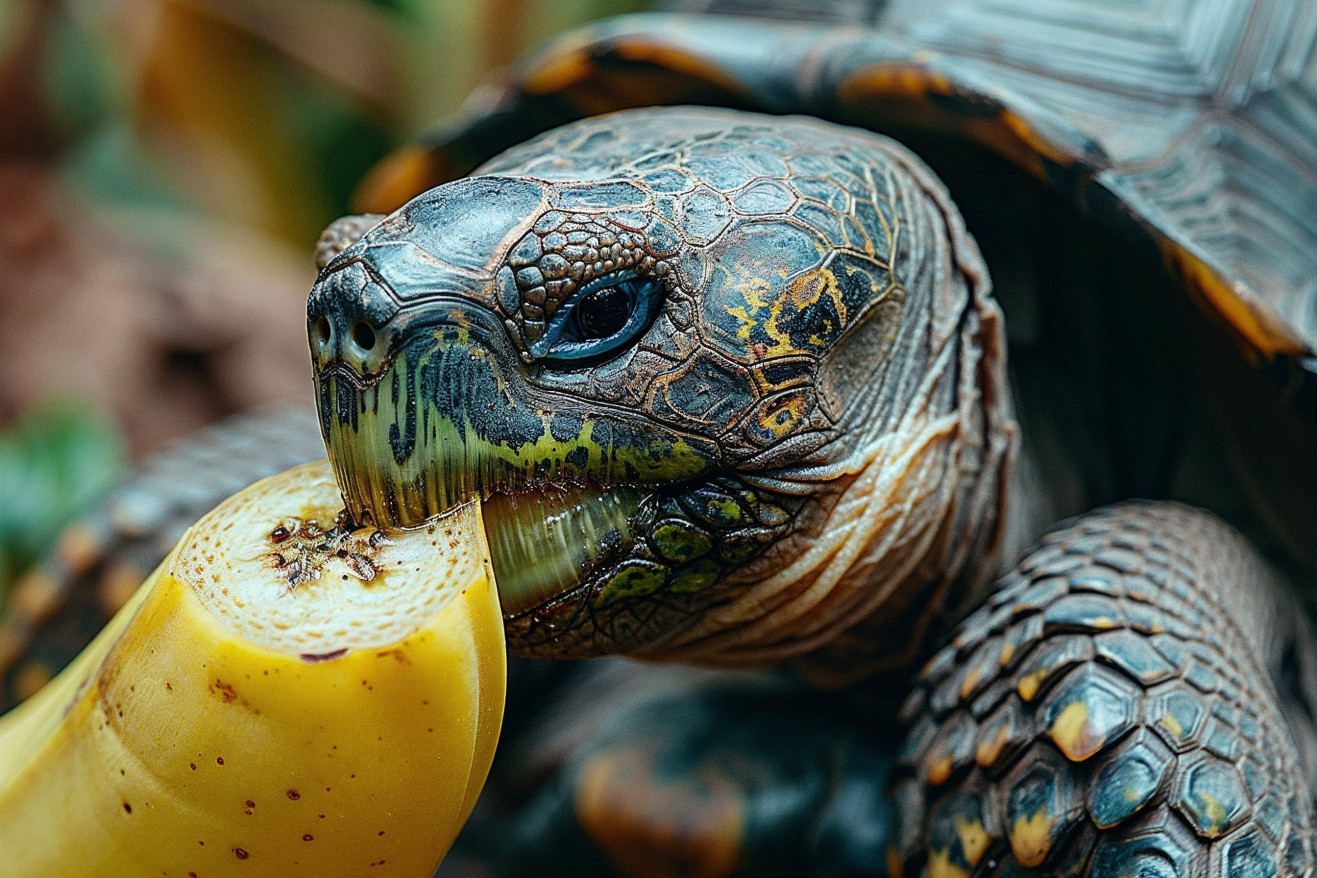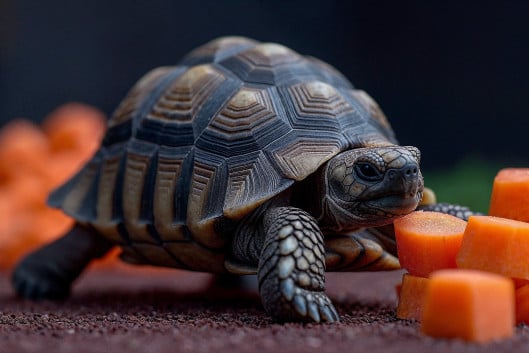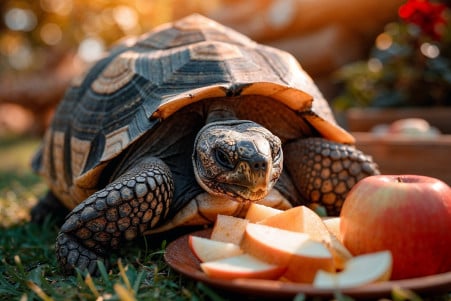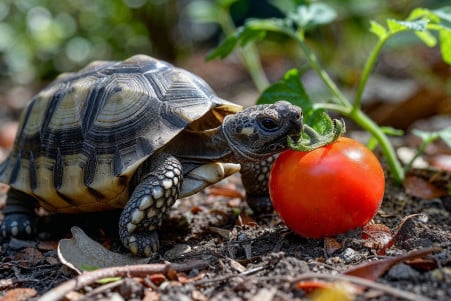Can Tortoises Eat Bananas? A Guide to Feeding Your Tortoise
29 May 2024 • Updated 28 May 2024

If you’re a tortoise owner, you’ve probably asked yourself if you can share your love of bananas with your shelled friend. The good news is that you can! Bananas are safe for tortoises to eat in moderation, but they should be part of a well-rounded diet that includes nutrient-dense leafy greens, vegetables, and some other fruits. That said, bananas do offer some important vitamins, minerals, fiber, and water that can be good for most tortoise species when given in the right way.
This article will cover the nutritional content of bananas for tortoises and provide evidence-based recommendations for how often and how much banana you can include in your tortoise’s diet. By combining information from veterinarians and experienced reptile owners, you’ll learn the best way to feed your tortoise bananas to support their overall well-being.
Can tortoises eat bananas?
Nutritional Value of Bananas for Tortoises
While bananas can provide some important nutrients, especially if they're fed to tortoises in moderation, it's important to note that they are also high in sugar. Bananas are a tropical fruit that is high in potassium, vitamin C, dietary fiber, and other vitamins and minerals according to ExoticDirect.
The potassium in bananas is important for helping to maintain healthy muscle and nerve function in tortoises. Vitamin C is an antioxidant and is important for healing wounds, and the fiber in bananas can help with digestion. As noted by AllCreaturesCA, bananas can also help with hydration in tortoises.
That said, it's also important to note that bananas are high in sugar. The Tortoise Table warns that too much sugar in a tortoise's diet can lead to problems like diarrhea and metabolic bone disease. As a result, it's important to feed tortoises a varied diet that includes lots of nutrient-rich greens, vegetables, and other foods in addition to the occasional banana. In general, it's best to feed tortoises bananas in moderation to avoid potential health problems.
General Banana Feeding Guidelines for Tortoises
While tortoises can eat bananas, according to Home & Roost, they can also be harmful due to their high sugar content. As a result, fruits should only be fed as an occasional treat and not as a staple of a tortoise's diet. The Tortoise Table also warns that the fruit of the banana or plantain should not be fed to a tortoise due to its high starch, sugar, and potassium content.
On the other hand, Vet4Life explains that fruits like apples and pears can be fed occasionally to provide fiber. As for bananas, they recommend feeding them in small amounts due to the sugar content, which can adhere to the tortoise's mouth and lead to secondary infections.
The bottom line is that bananas should be a small part of a tortoise's diet and balanced with other nutrient-rich foods, including leafy greens, vegetables, and other appropriate items. Home & Roost recommends mixing bananas with other fruits or vegetables to feed them to tortoises. In addition, feeding a variety of items can help ensure that a tortoise's diet is nutritionally balanced. In general, it's important to make sure that a tortoise's diet is balanced and varied to ensure that it gets the nutrients it needs.
Risks and Side Effects of Overfeeding Bananas
One of the biggest risks of overfeeding tortoises bananas and other high-sugar fruits is the potential for serious health problems. The Tortoise Table warns that too much fruit can lead to issues like diarrhea, kidney problems, and metabolic bone disease, which is caused by the high sugar and oxalate content in many fruits.
An unbalanced diet that includes too much fruit can also lead to nutrient deficiencies and other long-term health concerns for tortoises. Vet4Life notes that the high sugar content in fruits like bananas can cause sugar to stick to the inside of a tortoise's mouth, which can lead to secondary infections.
It's important to pay close attention to a tortoise's diet and adjust it as necessary based on the animal's individual needs and reactions. The Desert Tortoise Diet Sheet warns that overfeeding the foods that are considered treats can lead to a variety of health problems, including diarrhea and kidney disease.
By watching for signs of overfeeding or dietary imbalances, like changes in a tortoise's behavior or digestive issues, owners can make changes to help their pet get back on track. When it comes to feeding tortoises fruit like bananas, it's important to remember that less is more.
How to Change a Tortoise's Diet
It's important to change a tortoise's diet slowly, especially if you're trying to introduce fruits and vegetables. Mazuri explains that tortoises have different dietary requirements depending on their species, but all require a diet that includes grasses, greens, and vegetables. When changing a tortoise's diet to one that's more appropriate, it's important to be patient and persistent.
The Tortoise Table recommends offering new foods in small amounts with foods the tortoise is already familiar with to help them get used to the new items. This can be especially helpful if you're trying to move your tortoise from a diet that includes too many fruits and salad leaves to one that includes more nutrient-dense greens and vegetables. Gradually increasing the variety of safe, appropriate foods can also have a number of health benefits.
Not only does a varied diet ensure that a tortoise gets all of the nutrients they need, but it can also improve their quality of life by providing more mental stimulation and environmental enrichment. Green Lane Farm Boarding Kennels explains that tortoises can eat a wide variety of fruits and vegetables, so it's important to mix up their diet. With time and dedication, tortoise owners can change their pet's diet to one that's healthier and more balanced.
Conclusion: Finding the Right Balance Between Banana Treats and a Healthy Tortoise Diet
Although bananas can offer some valuable nutrients to tortoises in moderation, it is important to think of them as a supplement to a well-rounded diet that is primarily made up of nutrient-dense greens and vegetables. Overconsumption of bananas and other fruits high in sugar can lead to serious health problems, including diarrhea, kidney issues, and metabolic bone disease.
Tortoise owners must be vigilant about their pet's diet and make adjustments as necessary to ensure that they are getting the right nutrition and maintaining their health. When it comes to introducing new foods like bananas, it is best to start slowly and in small amounts in conjunction with the tortoise's regular diet. Working with a vet or an experienced reptile owner can also help ensure that the tortoise's specific dietary needs are being met.
In the end, a nutritious and stimulating diet is a key component of a tortoise's long-term health and well-being in captivity. By learning about the role that bananas and other foods play, owners can make sure that their tortoises are set up for success.


